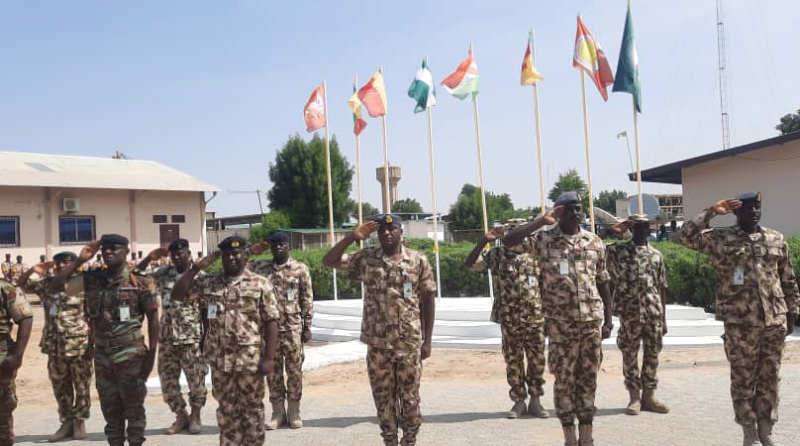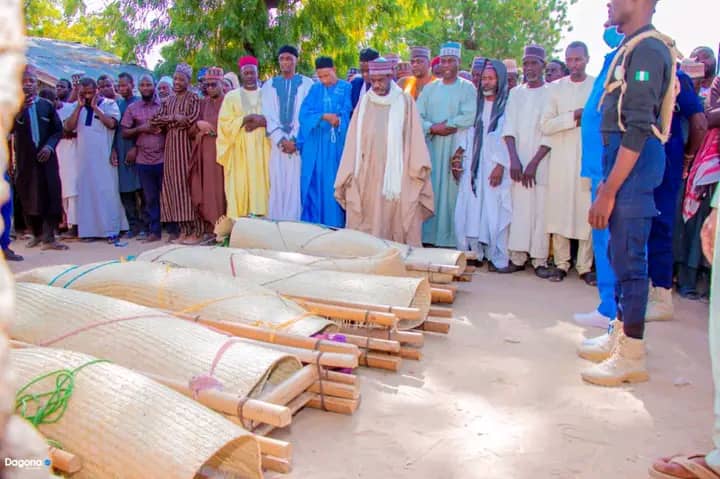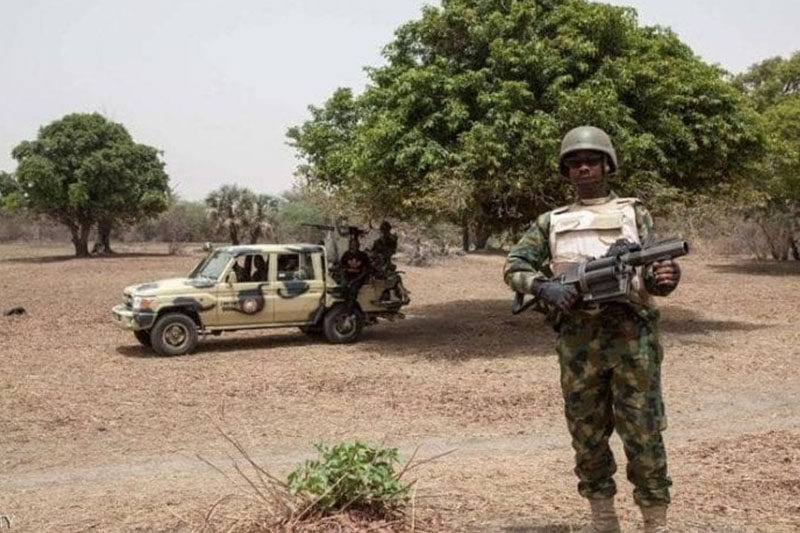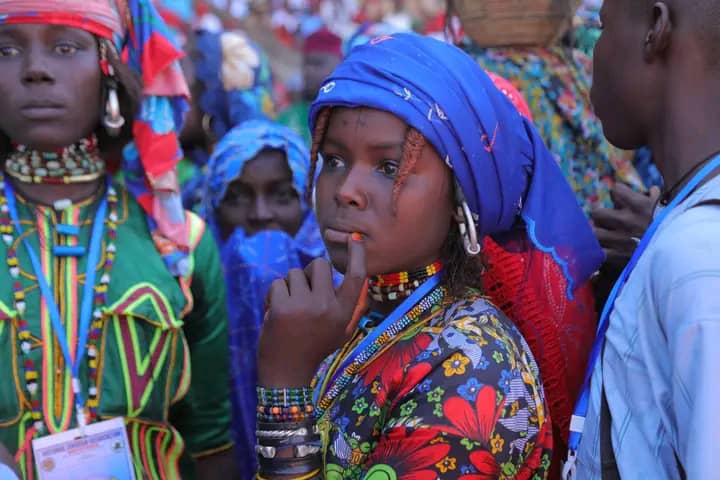ABOUT THE MNJTF
The Multinational Joint Task Force (MNJTF) was established in 1994 by Nigeria to checkmate trans-border armed banditry around the general area of the Lake Chad Basin (LCB) and facilitate free movement along Nigeria’s northeast border. Initially, only troops from the Nigerian Army operated it, in liaison with the militaries and security agencies of the Lake Chad Basin Commission (LCBC) member countries.
In 1998, the force received a boost and was made fully multinational by the inclusion of Chadian and Nigerien troops who, with their Nigerian counterparts, had the mandate of dealing with common cross-border security challenges within the Lake Chad region. The MNJTF doused much of the insecurity in the LCB until 2009 when the Jamā’at Ahl as-Sunnah lid-Da’way Wa’l-Jihād (JAS), better known as Boko Haram, surfaced within the general area. This plunged the LCB back into a state of insecurity as the bandits and other cross-border criminal gangs that earlier operated within the LCB provided the recruitment base for the insurgents.
In 2014, the spate of JAS activities heightened leading to the displacement of communities as well as the dislodging of some military locations. Coincidentally, the MNJTF headquarters, then in Baga, was overrun by the group in 2015. The atrocities of the JAS led to the dramatic deterioration of socioeconomic activities in the region.
The JAS were strong, attacking towns and military bases and posts, killing soldiers, ordinary citizens, raping and abducting girls and women and displacing millions of inhabitants who fled to what they perceived were safer areas.
The heads of states in the LCD – Cameroon, Chad, Niger, and Nigeria – as well as the Africa Union and the United Nations, support the MNJTF, the headquarters of which are now in N’Djamena, Chad.
In an exclusive interview with RNI, the MNJTF’s head, Force Commander Major-General Abdul Khalifa Ibrahim, who was appointed last year, spoke about security in the region and what the MNJTF is doing to protect lives and properties of the people in the region.
MNJTF OPERATIONS / COORDINATION
Recently we conducted a united exercise, as part of the ongoing Operation Lake Sanity, made up of troops from Nigeria, Niger, Cameroon and Chad. We stayed in field for more than three months and it was successful.
Apart from the MNJTF, we collaborated with Cameroonian troops and Sector 1 Operation Hadin Kai of the Nigerian Army and worked together in the jungle. While we were there, we successfully cleared areas, including Arena Ciki, Tumbuma, Tumbun Rago, Tumbun Fulani, Fedondiya, Arege and Doron Naira, among many other places.
These are areas have not had a problem with insurgents for a long time until recently. We neutralised many insurgents and took a lot of weaponry equipment from them.
LACK OF COORDINATION
Operation Lake Sanity has shown that there is synergy among us, despite our different backgrounds. For example, Nigeria and Niger belong to ECOWAS (the Economic Community of West African States), while Chad and Cameroon belong to the Central African States. But even though there have been some challenges, we know the strategic direction of the leaders of the region, as well as the military forces, and we work well together.
In a past operation, one of the states joined later than the others. So only three of the four were working together. It would have worked better if all four were engaged.
Delays have been a major issue which led to incoordination among the groups. We intend rectifying this.
COMMUNICATION WITHIN THE MNJTF
In the MNJTF, Nigeria holds the position as the force commander. The position of deputy force commander and chief of staff is rotated in turns among Chad, Cameroon and Niger.
RESETTLEMENT, FARMING AND FISHING IN THE LAKE CHAD REGION
We liaise with the state government before any repatriation takes place and they inform us if there is a military presence in the area. We hold discussions and then advise them if it is the right time for resettlement. In Nigeria, Operation Hadin Kai leads; in the other countries the MNJTF leads.
We realise that we cannot claim to be winning the war if internally displaced persons are still in camps and we have agreed to ensure that the IDPs will have security when they return to their ancestral communities. We have to be certain that their resettlement is peaceful.
Already many IDPs have returned to Ngoshe, Aulari, Kawuri and Marte. There have been some issues but the IDPs prefer being back in their communities. Unfortunately, we cannot ensure a 100% lasting peace when resettling people.
ANY COMMUNITY UNDER CONTROL OF INSURGENTS?
There is no place that is under the control of the armed groups. However, criminals are highly mobile, moving from one bush to another. They could be hiding within some areas but they are not in control even in the areas that are hard for our land forces to reach because we carry out devastating airstrikes in these regions.
As more insurgents have surrendered, we have received better intelligence and a lot of useful information.
UPDATE ON GUZAMALA AND ABADAM LGAs
We have already carried out operations and criminals were chased away. We have troops on permeant deployment in the regions. But it should not take long before we are fully in control.
INACCESS TO FARMING AND ATTACKS IN RETURNED COMMUNITIES
The Doron Baga area was recaptured by troops three years ago and after that civilians returned. We checked people who entered the areas to ensure criminals could not infiltrate. Slowly the residents have been gaining resilience. Security forces were sent to the area, tightening defence. We are at the stage where we are allowing them to have limited access to their farms and then also to start fishing. We cannot allow them to go too far into some lake areas until we get more troops and equipment so that their access will not be restricted.
We are looking at other places – particularly in Dikwa, Monguno and Damboa – to see what needs to be done to make life better for them.
Things are getting better in the Lake Chad region which is a trajectory of hope. Recently more of the Chibok girls have been released. We are not where we want to be, but we are getting there.
In the Monguno Local Government Area, I learnt from someone that they have not been able to farm their lands for a very long time.
I also learnt that members of the MNJTF have embarked on patrols to try to ensure farmers can return to work on their lands in peace.
We are not resting on our oars, we are getting more equipment and the effect will be felt soon because residents will be more secure.
MASS SURRENDERING
It is not a claim by the Theatre Command of Operation Hadin Kai, but a fact that more than 80,000 insurgents have surrendered. They include fighters and their families, as well as many who had been held captive and forced to farm by the insurgents.
Even in Chad, Niger and Cameroon we still have some people surrendering but it is not on the huge scale as it is in northeast Nigeria. Often when we arrest about 20 Boko Haram, you find that 15 are actually Nigerians and only five from Niger. It is the same in Cameroon.
We have formed a liaison with authorities and the Borno State government has agreed to send them back to where they came from.
The numbers keep increasing which is a welcome development.
The surrender of insurgents is due mainly to military operations and dialogue, infighting between the criminals, which we actively encouraged and we will continue to do so, and blockades so they cannot get necessary items that they used to get.
It is not something that will happen overnight but by the grace of God the end of the conflict in the northeast and the Lake Chad region is near.
We want to push the Boko Haram to come out and say they want to surrender. That is our mission and we are sure we will achieve it.
FACTORS THAT LED TO MASS DEFECTION
The mass defections have come about by military offences and dialogue, during which one of the agencies talks to them and encourages them to surrender, and through strategic communication. The media has also played a role. We are still appealing to the insurgents to drop their weapons and come out.
We are trying our best to see if we can get more of the Chibok girls released, as well as other hostages, so that people can go back to the life they left when security agents did not have to escort them while they tended to their farmlands and continued with their other normal activities.
MASS SURRENDERING / REJOINING THE INSURGENCY?
The government and relevant agencies must attend to this issue to end the conflict. It should do whatever it takes, even collaborating with international bodies, to try to ensure that those who surrender see it as a positive move that will bring an end to the conflict.
When the insurgents in the bushes decide to surrender, they make contact with our forces and we are obliged by international laws to receive them and hand them to the government but we don’t promise anything. It is not the job of the military to promise them anything. What we can promise them is that if they genuinely want to surrender, we will hand them over to the government and other appropriate agencies for further processing.
It’s not the military’s responsibility to do that – it’s the responsibility of the government and other agencies, even though such has been done by General Asagu in Sierra Leone, in Liberia and in other parts of the world through the disarmament, demobilisation and reintegration (DDR) programme during which those who surrender can be trained on what they can do to promote peace and how to leave behind their fighting life.
They should learn from history because rebel groups either surrender, disband or are defeated with their weapons taken away. They should learn from such.
The time is right to end this conflict and we will keep pushing from the military angle, hoping other partners and the government will support us by holding dialogues and doing what they can to encourage support from everyone concerned. Traditional rulers should also make this call.
Recently, some women were caught by troops carrying supplies to the criminals. How can this end when people are doing that? It is not right and it is a setback to our efforts.
CALL FOR RELEASE OF SUSPECTS IN DETENTION BY HUMANITARIAN AGENCIES
Generally speaking, we believe those in detention should be properly investigated. There are cases when people have been imprisoned just because they are thought to be criminals but might not actually be guilty or their crimes might not be significant. But, of course, this is a decision the government needs to take.
OVERWHELMING FIGURES OF SURRENDERED PERSONS
Up until recently, we did not know how many people were part of the insurgency hiding in the Sambisa Forest, the Lake Chad Basin and other areas. The number is overwhelming and that is why I reiterate my call for the need for a deliberate and systemic investigation to see how to solve these problems – where to keep them, what to do with them and how the to give them incentives to remain at peace. The women and children who surrender also need proper care.
LACK OF FUNDING AND ITS IMPACT ON THE MNJTF OPERATIONS
There is no single army that will have everything it needs. But the Nigerian government has been very supportive of the MNJTF and it has done what it can to help us, despite the obvious and multiple security challenges in the country.
We have been supported in many ways and we are grateful for that.
The support was evident in the recently concluded Operation Lake Sanity and now we are planning for the next phase of the operation, knowing there will be support. I can assure everybody that we will continue to work as hard as we can so that our society can return to normal.
INVITING PRIVATE MILITARY CONTRACTORS
Honestly, I have no comment about this. I leave it up to my superiors to respond.
FINAL MESSAGE
In the Lake Chad region and part of the northeast, we have had seen a tremendous improvement in security. About 60,000 to 80,000 people have returned to their ancestral homes and communities and this can be verified in places such as Banki, Baga, Doron Baga, Kross Kauwa and, recently, about 500 households were moved to Mallam Fatori by the Borno State government. This was the result of support from the MNJTF and Operation Hadin Kai.
There are more than 6,000 civilians in Mallam Fatori and for the first time they held the Eid prayer.
In Niger, Barwa, which was under Boko Haram control, is no longer controlled by them after we drove the insurgents from there in 2016/2017. It is a big town now with more than 10,000 people who have returned. There are plans to resettle more of the villagers in Niger as well.
In Cameroon, in places such as Kolofata and Amchide, people keep returning every day and this can only get better.
In Chad, also, there are places where people have returned. One example is in Baga Sola. There are a number of Nigerian refugees whom the government is planning to return to their communities.
Collectively, all these positive moves show that the people who fled the conflict are returning home and gradually things are getting better. The economy in these places is gradually picking up, many schools have reopened and hospitals are beginning to function as normal. We hope this will get even better when more people return to their communities.
My message is to thank all our people for having endured the unnatural situations in which they found themselves. I know they have suffered great hardships but I implore them not to give up hope because the end is in sight.
We will continue to do everything in our power to ensure peace will be restored.
We ask that they should support security forces, particularly if they have credible information that we can analyse and use as intelligence to help bring an end to the violence. If they have children who have joined the insurgent groups, we implore them to urge their loved ones to lay their arms and come out from the bush to join the more than 80,000 who have surrendered. They need to know there is nothing to fear if they surrender.
We thank the government and the chiefs of defence staff in the Lake Chad Basin countries for their support but we also remind them that we need more support.
In our last operation we did not have many casualties among our troops because we used the mine–resistant ambush protected light tactical vehicles. We lost a few of our members to improvised explosive devices and some were wounded. It is important to note that the more modern equipment you have the better it is to protect and keep your population secure.
AISHA SD JAMAL









